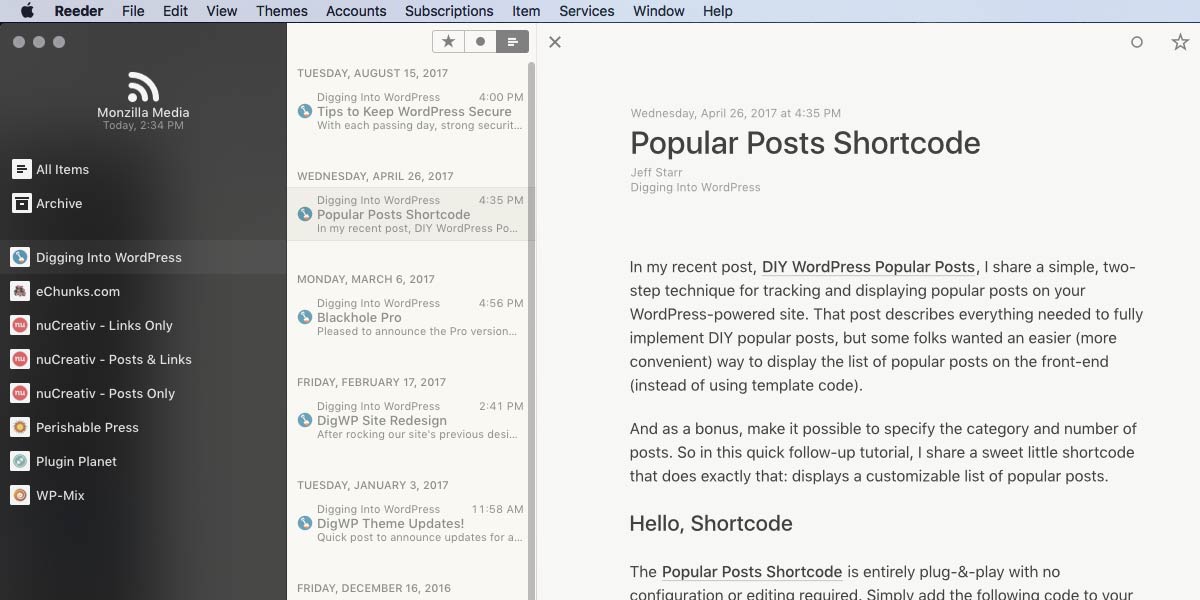For me, 2024 is all about simplifying workflow and removing any speed bumps in my routine. Next stop: Goodbye to my two long-lived Hotmail accounts. I’ve had these accounts since forever, set up way back in 1998. For the first few years, I used my Hotmail accounts for everything. Then I got into web development and learned how to host my own email. As time went on, I used the Hotmail accounts less and less. Until now they are mostly […] Continue reading »

There are plenty of ways to sync news feeds across all of your devices. There are free services, paid services, and even scripts that you can host on your server. This quick tutorial explains two ways to sync your feeds on any device. The first method uses the free service from Inoreader, which works via web browser on any device. And the second method combines Inoreader with the Reeder app for a better experience on macOS and iOS. Continue reading »

As a full-time web developer and typical human being, I rely on the Internet for a great many things. So when the Internet is not available, my work (and play) comes to a grinding halt. Fortunately my primary ISP is pretty solid, but it still goes down every once in a while. So to maintain my workflow (and general sanity), having a backup Internet service provider is absolutely essential. Here’s one way to do it.. Continue reading »
Traceroute not working correctly via macOS Terminal app, which is how I’ve been doing it for years now. For some reason, the traces hang up and never complete for certain sites. After some time troubleshooting and not finding any solution, I decided to look for alternate ways of performing traceroutes and site pings. Fortunately there are tons of free tools. Here are some of the useful services and apps that I’ve found.. Continue reading »
I use domain-based emails for 99% of my email activity. The other 1% is comprised of assorted 3rd-party email services and temporary slash disposable addresses (like for testing purposes and one-off sign-ups, etc.). I can tell you whole-heartedly based on 20+ years working online that self-hosted email is THE WAY to go. Continue reading »

Like many of you, I have been working online for years now, more than most. Over the course of the past 20 years, I have created accounts at hundreds and hundreds of websites. That includes all the work-related stuff, like web development, plus LOTS of social media sites, online services for everything from email to security monitoring. Not to mention all of the accounts created for mundane things like banking, utilities, Internet and phone service, and so forth. Continue reading »

Heads up about the JavaScript Errors Notifier extension for Google Chrome. Looks like it was removed from the Chrome store sometime last year. Not sure of the reason behind it, but can tell you that currently there are no suitable extensions to replace it. Kinda sucks because JavaScript Errors Notifier was one of my favorite “always on” extensions. It makes it easy to spot any JavaScript errors as you develop, design, or browse the Web. Fortunately there’s still a way […] Continue reading »

It’s sad that we’ve arrived at a place where it needs to be said. Unfortunately, 3rd-party email services such as Yahoo, Hotmail, Gmail, and so forth have to deal with tons and tons of spam. So they tend to use very aggressive spam-filtering rules. Overly aggressive, in many cases. Continue reading »

I’ve tried 1Password and Dashlane, and several other popular password managers for both Mac and PC. It always seems to be the same thing: things start off great and then go downhill from there. For example, I was loving 1Password, and then it locked me out of my password file/account. Likewise for a couple of years Dashlane was great, but then they started making drastic changes like moving from standalone app to browser extension Web-based UI. The confusion involved with […] Continue reading »

Want to stop Google Chrome browser from constantly asking for permission to “know your location”? This mini tutorial shows how to do it quickly and easily, for Google Chrome versions (around) 83 and better. Continue reading »

This post is a bit different than my regular in-depth tutorials. This is where I scribble down notes and thoughts about my experience switching from Photoshop (PS) to Affinity Photo (AP). As I continue to learn AP and collect more notes, I’ll add them to this post. It’s an informal work in progress. To give some context of where I’m coming from, I have around 20 years experience working with Photoshop (and other Adobe apps). Like many others, for me […] Continue reading »
![[ The Cleaner ]](https://perishablepress.com/wp/wp-content/images/2020/professional-cleaner.jpg)
Zipping files on Apple/Mac is a chore because of all the hidden files and folders added by macOS. Like .DS_Store and __MACOSX are two of the most common files and folders that are added to zip files when compressed on macOS. The folder named __MACOSX especially is problematic because it contains duplicates of every file in the zip archive. So for example, if you use Finder to compress 20 files, the resulting zip file will contain the original 20 files, […] Continue reading »
![[ Screenshot of pathetic Facebook post ]](https://perishablepress.com/wp/wp-content/images/2020/how-to-ask-questions.jpg)
I see so many technical (and other) questions in forums and social media that go unanswered. Not due to lack of trying, but due to lack of understanding. People posting questions like this (an actual post in a popular PHP group on FB): Continue reading »
It is debatable whether or not Chrome’s new scrolltotextfragment feature is a significant security concern. When in doubt, play it safe. This quick post explains how to disable (or enable) Chrome’s scroll-to-text-fragment functionality. Continue reading »
![[ Get Help ]](https://perishablepress.com/wp/wp-content/images/2019/ask-get-help-cat.jpg)
When working online or offline in the real world, it’s inevitable that you will encounter issues and problems with products, services, and everything else. This quick post explains when, where, and how to ask for help: The Three Golden Rules. It’s a general guide, aimed at those who may be unfamiliar. Continue reading »
![[ The circle is now complete. ]](https://perishablepress.com/wp/wp-content/images/2018/circle-now-complete.jpg)
In previous posts, I’ve explained how to verify identity of search engines and other bots, by looking up the host name and then doing a reverse lookup to cross-check the IP address. This is often referred to as a forward-reverse lookup, or something to that effect. The point is, there are plenty of free online tools available for performing forward-reverse IP/host lookups. And online tools are great, but it’s also possible to do forward/reverse lookups directly via the command line, […] Continue reading »









![[ The Cleaner ]](https://perishablepress.com/wp/wp-content/images/2020/professional-cleaner.jpg)
![[ Screenshot of pathetic Facebook post ]](https://perishablepress.com/wp/wp-content/images/2020/how-to-ask-questions.jpg)
![[ Get Help ]](https://perishablepress.com/wp/wp-content/images/2019/ask-get-help-cat.jpg)
![[ The circle is now complete. ]](https://perishablepress.com/wp/wp-content/images/2018/circle-now-complete.jpg)